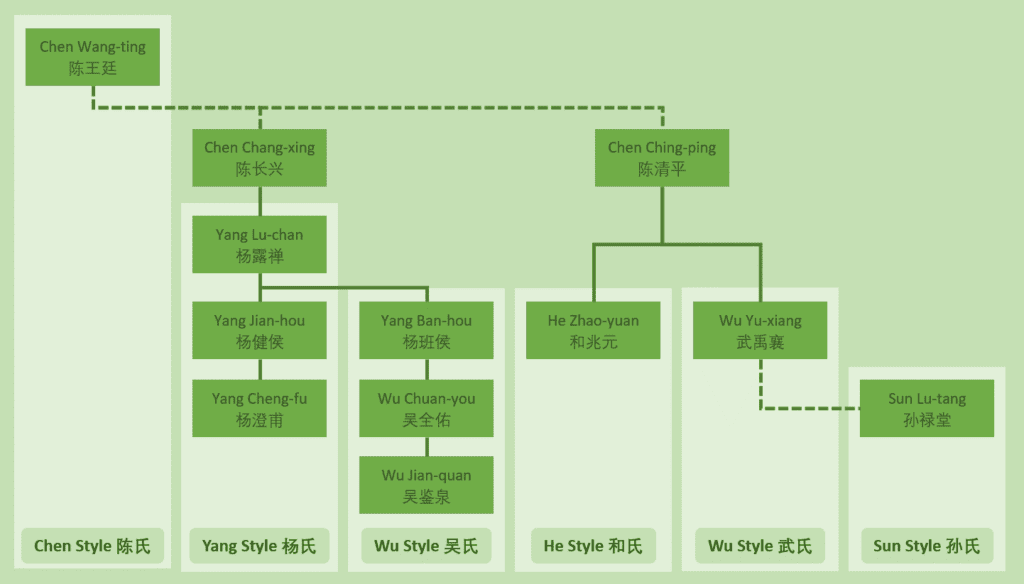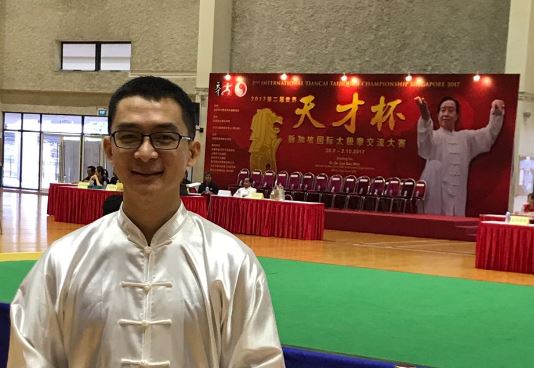Page Contents

Different schools of Tai Chi Quan
Tai Chi Quan has many different forms or styles, the popular styles and Masters are shown in Figure 1. Each style emphasises slightly different principles and methods, some styles focus on health aspect, more suitable for general learners, while others focus more on the self-defense aspect.

Benefits of learning Tai Chi Quan
Practising Tai Chi Quan is beneficial to your overall health and well-being. The common health benefits are such as:
- Better blood and Qi circulations through breathing exercise that improves aerobic capacity, energy and stamina.
- Helps to lower blood pressure and improve symptoms of congestive heart failure.
- Better flexibility, balancing and agility through stronger joints, toner muscle group. Reduce joint pain and risk of falling in elderly.
- Shaper memory through memorising and performing complicated steps.
- Improves mood by decreasing stress, anxiety and depression. With that, it also enhance the quality of sleep.
- Enhance overall immune system through regular exercising.
More explanations on the health benefits of Tai Chi Quan can be read here.
Exercise or self-defense?
Even though Tai Chi Quan originated from a martial art, today, it is more commonly learned for good health instead of self-defense. Tai Chi Quan is contested in many sports events, but unlike other tournaments (Karate, Taekwondo, boxing, etc.), the emphasis is on the accuracy, difficulty, and gracefulness of the performance, rather than defeating opponents through striking and kicking.
How do you start?
You can pick up Tai Chi Quan from 2 sources:
- Joining interest group
- Self-learning
If you are a beginner, signing up a Tai Chi Quan class that is available at your local community centre or park would be the preferred option. You need an experienced instructor to guide you along, and you would probably learn faster in a group setting.
Once you are more seasoned practitioner, you may explore and reference other styles of Tai Chi Quan that are available on internet, CD/DVD, and books. That way, you can better harness the skills from various styles and appreciate them more.
Which style is good for beginner?
For a beginner or anyone with medical or physical challenges, it is always recommended to start from Yang Style (杨氏) or Wu Style (吴氏) Tai Chi Quan. They are more graceful, gentle, and slower pace, it does not require learners to perform challenging stances. Once you are better (usually after a few years), you may explore other more challenging styles such as Chen Style (陈氏), Sun Style (孙氏) or He Style (和氏) Tai Chi Quan.
Throughout the journey of learning Tai Chi Quan, you will get to advance the forms by learning more steps and even using weapons such as fan, sword, sabre, spear, long pole, guandao, etc.
Conclusion
Learning Tai Chi Quan is not a smooth journey. It requires patience, determination, good hand-eye coordination, and sharp memory. Hence, setting a weekly practice routine is important to ensure you can gradually master the form. Of course, practising as a group is definitely helpful for beginners.
Participating in Tai Chi Quan competition or performance will also help to improve your skill, conquer stage fright, and boost your self confidence.

